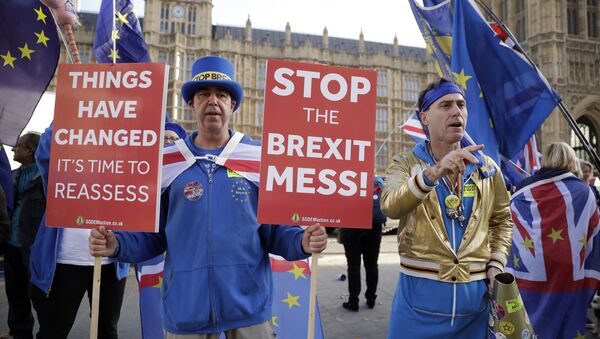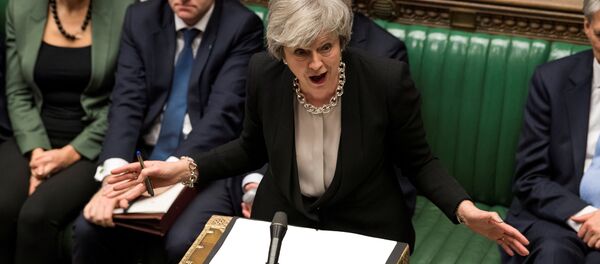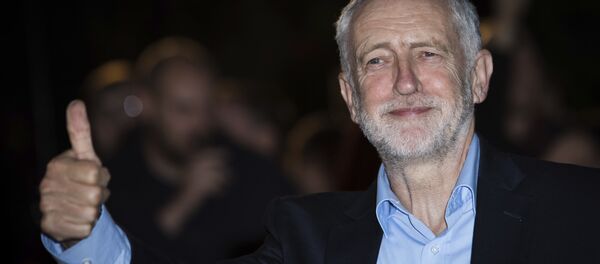After the British Parliament voted in favour of yet another extension of Article 50, Prime Minister Theresa May addressed EU Council President Donald Tusk asking him to delay the Brexit deadline to 30 June 2019.
"I am writing therefore to inform the European Council that the United Kingdom is seeking a further extension to the period provided under Article 50(3) of the Treaty on European Union…. The United Kingdom proposes that this period should end on 30 June 2019", May emphasised.
For his part, Donald Tusk came up with the idea of a 12-month "flexible" extension for the Brits, thus reducing the risk of the UK's no-deal withdrawal. Tusk's proposal would allow Britain to leave the bloc "whenever" UK lawmakers ratify a Brexit deal within 12 months.
However, Macron's 2 April remark that the EU "cannot be held hostage" to the simmering Brexit crisis leaves the door for the no-deal Brexit wide open, according to The Guardian.
New Extension May Require UK to Take Part in European Parliament Vote
Edgar Morgenroth, professor of economics at the DCU Business School of Dublin City University, Ireland, believes that at the moment, May's extension request "is going to be seen a little bit critical[ly] by the EU, because they are going to have European Parliament elections [on 23-29 May]".
Giving his prognosis on the cross-party talks on a Brexit deal, the academic expressed doubt that the impasse would be broken any time soon.
Morgenroth opined that "ultimately there will have to be a shift in what's called 'red lines', demands from the two sides, so that a compromise could be found". He pointed out that this potential compromise should also be compatible with both the EU's views and the aspirations of the British public.
"You would probably need to run another referendum to establish that", he suggested.
He further highlighted that German Chancellor Angela Merkel's visit to the Republic of Ireland was "quite reassuring" for the small EU member state: "There's always that fear that maybe the bigger member states would abandon those smaller ones in any difficult decisions", the professor said, adding that in this case, it was clear that the EU firmly stands behind Ireland.
Speaking to reporters in Dublin, Merkel made it clear that the bloc would try to avoid a hard border in Ireland, an EU member state that has a common frontier with the UK, in the event of a no-deal Brexit.
What's Behind May's New Strategy?
The question then arises as to what PM May is hoping to achieve in the three-month extension time, given that not much has been achieved for the past two years.
According to Lawk Ghafuri, a London-based political analyst, who specialises in international business and economy, what Theresa May pins her hope on is a potential agreement with Jeremy Corbyn's Labour Party.
"That's the new strategy that Prime Minister Theresa May is trying to achieve, because the only obstacle that was standing against Theresa May and her deal… was mainly Jeremy Corbyn, the leader of Labour Party, because they thought that the deal was weak… and was not going to achieve what the UK is hoping for", the political analyst stressed.
Commenting on Donald Tusk's proposal, Ghafuri opined that it was a "perfect offer for Theresa May" under the current circumstances. Right now there are only two options for the British PM, he said, "no deal, which is going to be a disaster for the UK and even the EU, or more delays".
According to the political analyst, although the no-deal is still on the table, one needs to bear in mind that it would affect not only the British economy, but the economies of France and Germany.
Disorderly Brexit Would Deal a Heavy Blow to EU Member States
Dr Menno Aden, a retired professor of law at the University of Applied Sciences in Essen, also voiced concerns over the potential no-deal outcome. According to him, it could deal a blow to Germany's economic interests, in particular.
"70 percent of German companies expect [in] 2019 a deterioration in business with Great Britain. But there can be only limited preparation for a 'hard' Brexit. More than half of the companies cannot yet evaluate the consequences of Brexit", he said, adding that some effects of Brexit are already noticeable.
According to him, a no-deal Brexit is fraught with various risks, with customs bureaucracy being considered the biggest one.
"In the event of a disorderly Brexit, up to ten million new customs declarations at [an] estimated additional cost of €200 million could follow from customs bureaucracy alone. Indirect costs of customs bureaucracy: time spent in filing customs declarations and customs clearance. This can lead to delivery delays", he underscored.
"Conversely, the UK would probably levy customs duties on its part. That would increase the billions in cross-border trade and affect trade", Aden underscored, adding that it is "particularly difficult to assess the legal consequences of Brexit".
When asked whether Paris and Berlin could interfere in the EU's Brexit talks with the UK to prevent a no-deal Brexit, he presumed that "Germany and France alone cannot do anything".
"However, France and Germany, if they wished to do so, could force a change in existing agreements with Great Britain because of their real weight in the EU. That would be a very bad example for future cases of a similar kind. I cannot imagine that a German politician would be willing to do so. I do not think that France would give in to it", the professor emphasised.
The views and opinions expressed by the speakers do not necessarily reflect those of Sputnik.






